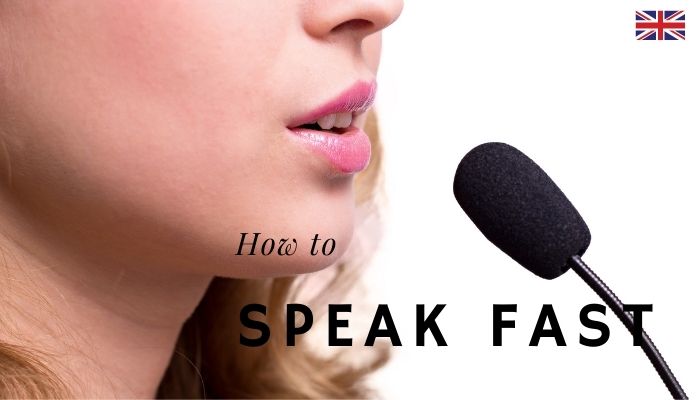Great site to keep my english skills updated for work and travel. I am really enjoying the lessons!
Maria C
 Argentina
Argentina


Molti studenti di inglese notano che i madrelingua inglesi tendono a parlare velocemente, quindi pensano che parlare più velocemente aiuterà il loro inglese a sembrare più fluente. Ma devi stare attento: può essere pericoloso cercare di parlare molto velocemente in inglese se non segui questi suggerimenti.
Perché? Bene, ci sono due ragioni. Prima di tutto, se la tua pronuncia non è chiara, parlare più velocemente non farà altro che peggiorare le cose e le altre persone non ti capiranno.
E in secondo luogo, parlare in modo particolarmente veloce a volte può dare l'impressione che tu sia nervoso o insicuro, che non sei sicuro di te. Questo suggerimento si applica anche ai madrelingua inglesi: quando qualcuno parla un miglio al minuto (che significa molto velocemente) può farlo sembrare nervoso o a disagio, o non pensare davvero a quello che sta dicendo. Quindi, come ho detto, fai attenzione a non esagerare (non fare troppo) nell'aumentare la tua velocità di parola.
Impara come migliorare la tua padronanza dell'inglese e come parlare inglese più velocemente con le comuni contrazioni informali in inglese.
Per esempio:
• What are you going to do?
• Whatcha going to do?
• Whatcha gonna do?
o
• Do you want a beer?
• Do you wanna beer?
• D’you wanna beer?
• D’ya wanna beer?
• Ya wanna beer?
• Wanna beer?
CONTRATTI INFORMALI COMUNI PER SUONARE COME UN NATIVO
Le contrazioni informali sono quando combiniamo due o più parole ad alta frequenza per farle andare più velocemente ed essere più facili da dire. I madrelingua lo fanno automaticamente. Siamo abituati a sottolineare le parole importanti e a ridurre quelle che non contano.
1. Ain’t = Am not/are not/is not
E.g. She ain’t hungry.
2. Ain’t = Has not/have not
E.g. He ain’t done it yet.
3. Wanna = Want to
E.g. I wanna go home.
4. Wanna = Want a
E.g. I wanna coffee.
5. Whatcha = What have you
E.g. Whatcha got there?
6. Kinda = Kind of
E.g. Anna’s kinda cute.
7. Sorta = Sort of
E.g. She’s sorta tired.
8. Outta = Out of
E.g. I’m outta money.
9. Alotta = A lot of
E.g. I eat alotta chocolate.
10. Lotsa = Lots of
E.g. He has lotsa money.
11. Mucha = Much of
E.g. It’s not mucha a surprise, is it?
12. Cuppa = Cup of
E.g. Would you like a cuppa tea?
13. Dunno = Don’t know
E.g. I dunno.
14. Lemme = Let me
E.g. Lemme see!
15. Gimme = Give me
E.g. Gimme the book!
16. Tell’em = Tell them
E.g. We should tell’em the truth.
17. Cos = Because
E.g. I cry cos I’m in pain.
18. Innit? = Isn’t it?
E.g. It’s blue, innit?
19. I’mma = I’m going to
E.g. I’mma talk to my mother.
20. Gonna = Going to
E.g. I’m gonna tell you the truth.
21. Needa = Need to
E.g. You needa know about Jame.
22. Oughta = Ought to
E.g. You oughta phone your brother.
23. Hafta = Have to
E.g. We hafta go.
24. Hasta = Has to
E.g. John hasta work today.
25. Usta = Used to
E.g. She usta live in France.
26. Supposta = Supposed to
E.g. I’m supposta start a new job on Monday.
27. Cmon = Come on
E.g. Cmon, let’s do it together!
28. Ya = You/ you are
E.g. I miss ya.
29. Gotta = (have) got a
E.g. Have you gotta phone?
30. Shoulda = Should have
E.g. She shoulda called yesterday.
31. Shouldna = Shouldn’t have
E.g. I’m sorry, I shouldna told you that.
32. Wouldna = Wouldn’t have
E.g. I wouldna done that if I were you.
33. She’da = She would have
E.g. She’da been prepared for class.
34. Coulda = Could have
E.g. He coulda been here by 5:00.
35. Woulda = Would have
E.g. He woulda arrived soon.
36. Mighta = Might have
E.g. You mighta left the book at the airport.
37. Mightna = Mightn’t have
E.g. She mightna caught her train.
38. Musta = Must have
E.g. She musta been in a hurry.
39. Mussna = Must not have
E.g. You mussna stolen the money.
40. Dontcha = Don’t you
E.g. Dontcha see it?
41. Wontcha = Won’t you
E.g. Wontcha watch this film?
42. Whatcha = What are you
E.g. Whatcha doing?
43. Betcha = Bet you
E.g. Betcha can’t guess who she is!
44. Gotcha = Got you
E.g. We gotcha!
45. D’you = Do you
E.g. D’you like him?
46. Didntcha = Didn’t you
E.g. Didntcha like this book?
47. S’more = Some more
E.g. I will need s’more time.
Dopo aver letto questo articolo, spero che tu ti senta molto più fiducioso nel comprendere e alla fine nell'usare queste contrazioni informali.
Controlla il tuo punteggio - Prova il nostro quiz inglese gratuito + Ottieni un bonus gratuito